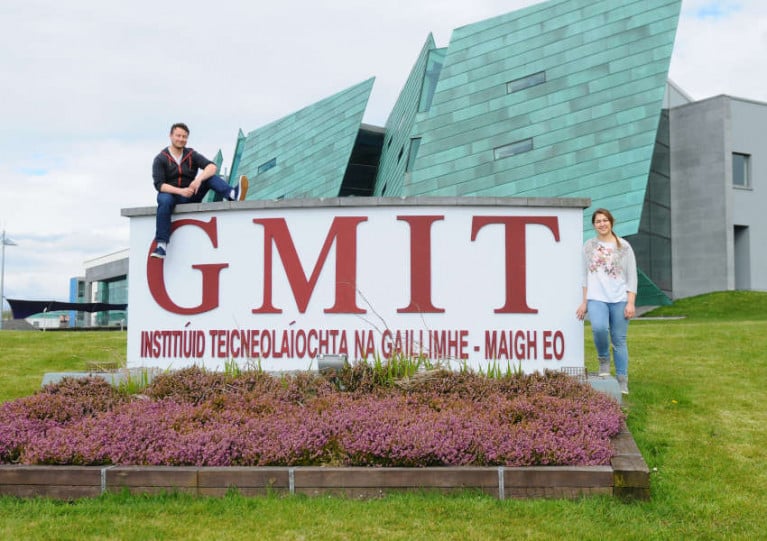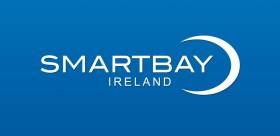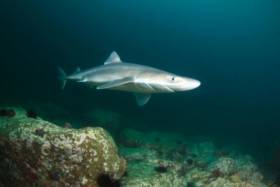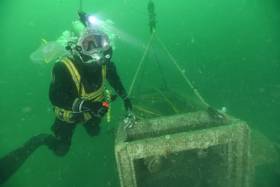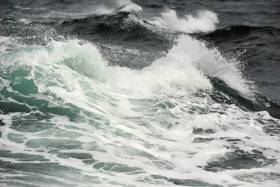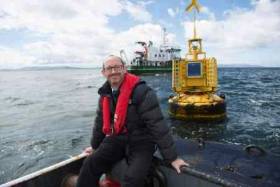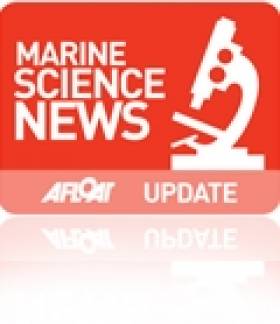Displaying items by tag: SmartBay
As part of this year’s events for European Maritime Day, the Marine Institute and BlueWise Marine will host a special SmartBay Observatory ‘family fun day’ this weekend.
Ahead of its redeployment in Galway Bay off the coast of An Spidéal/Spiddal, the ocean observatory will be on display at Stiúideo Cuan in the Co Galway town this Saturday 21 May from 10am to 5pm.
The day will also feature fun and educational marine workshops for all ages along with circus workshops and performances, face painting and more.
Once returned to the sea bed, the SmartBay Observatory will remain collecting scientific data 24/7. The observatory also hosts two underwater video cameras which continuously stream live footage to the public via the SmartBay website.
The SmartBay Observatory has been undergoing maintenance and upgrades in recent months and will soon be redeployed to its location 1.5km off the coast of An Spidéal in a depth of 20 meters.
“Having the rare occasion to showcase the SmartBay Observatory on land presents a unique and fascinating opportunity to learn and discover more about how we monitor the ocean,” said Alan Berry, section manager of marine research infrastructures at the Marine Institute. "We are looking forward to welcoming all to a fascinating and fun-filled day.”
To join in the fun this Saturday, be sure to RSVP to [email protected]
International Scientists Showcase New Advanced Technology at Galway’s SmartBay Observatory
An international team of scientists has demonstrated new advanced underwater technology for ocean observation at the SmartBay Observatory in Galway Bay this week.
French company SEABER demonstrated the YUCO micro-AUV (or micro autonomous underwater vehicle) — an unmanned, untethered vehicle that collects oceanographic data in coastal environments. This data is important for monitoring our marine environment and changing ocean climate.
The SmartBay Observatory is one of Ireland’s national marine scientific research facilities, providing national and international researchers with the infrastructure to validate new marine sensors and instruments in real sea conditions.
Alan Berry, manager of marine research infrastructures at the Marine Institute, said: “The SmartBay Observatory is used to validate new sensor technologies, such as SEABER’s innovative and affordable micro-AUV system.
“New marine sensor technologies increase the accessibility and availability of data for organisations monitoring our oceans and in turn contributes globally to our deeper understanding of the oceans.”
?French company #SEABER, demonstrated the YUCO micro-AUV, a micro Autonomous Underwater Vehicle, which is an unmanned, untethered vehicle that collects #oceanographic data in coastal environments at the @SmartBaySite in #GalwayBay. @JERICORI
— Marine Institute (@MarineInst) November 5, 2021
?https://t.co/ktMAfWKZuj pic.twitter.com/7lrThpc8wh
SEABER were successful through the EU JERICO-RI European Infrastructure JERICO-S3 Access Programme to utilise the SmartBay Observatory in Galway Bay.
Over the coming months, the observatory will facilitate a further four international science projects demonstrating novel and improved sensor technologies on this unique Irish research infrastructure towards the common goal of improving data collection for marine and climate observations.
Michael Gillooly, interim CEO at the Marine Institute, said: “By facilitating advanced ocean monitoring technologies, the SmartBay Observatory helps to take concepts and prototypes from laboratories into the sea.
“New marine monitoring technologies and sensors generate more data than we have ever had before, improving our ocean observation capabilities and increasing our ocean knowledge.”
For more information visit www.smartbay.ie, @SmartBaySite on Twitter and @SmartBaySite on Facebook. For more about the JERICO-S3 access programme, see the project website.
The JERICO-S3 project received funding from the European Commission’s Horizon 2020 Research and Innovation programme under grant agreements No 871153.
SmartBay Ireland Announces New Scholarship For Research With GMIT
SmartBay Ireland have collaborated with the Galway-Mayo Institute of Technology (GMIT) to launch a new scholarship scheme for a candidate from the Connemara Gaeltacht to begin a Master’s research programme.
Commencing in November 2020, the new programme aims to develop post-primary educational resources in the field of marine renewable energy.
And the scholarship, which is now open for applications, is designed to fund and support a candidate in the Connemara Gaeltacht Region — while also driving awareness around ocean literacy, marine renewable energy, and sustainability through education in local schools.
The successful candidate will receive full funding support to the value of €44,500 over the duration of the 24-month project, which will focus on the preparation and delivery of educational resources at post-primary level, in both English and Irish.
SmartBay Ireland general manager John Breslin said: “This scholarship is an excellent opportunity for the successful candidate not only to advance in their career, but to be at the forefront of developing educational resources and make a positive and lasting impact on the post primary curriculum.”
Applications are open until noon next Wednesday 16 September for candidates with experience as a post-primary educator, preferably in the field of science, with demonstrable proficiency and fluency in the Irish language.
“This is a very exciting opportunity which would suit an enthusiastic candidate with a passion for education, the marine and sustainability,” said Dr Róisín Nash, a lecturer at GMIT.
“At a time when research and management of essential marine resources are key features of a sustainable future, this is a unique project with lots of opportunities for the candidate to be creative and influential in incorporating marine and renewable energy into the classroom.”
The SmartBay Ireland Postgraduate Research Scholarship is funded by the Galway-Mayo Institute of Technology, the Marine Institute, the Sustainable Energy Authority of Ireland and Údarás na Gaeltachta.
Full details on the postgraduate research scholarship and application procedure are available from GMIT website HERE.
Seven Successful Projects Set For Access To SmartBay Test Site Under Funding Programme
Seven successful applicants will be awarded funding under the Marine Institute’s SmartBay National Infrastructure Access Programme (NIAP) following the 2018/2019 funding call.
The awardees will receive support of around €25,000 per project to trial and validate their technology and/or gain access to data feeds to carry out scientific research at the SmartBay Marine and Renewable Energy Test Site in Galway Bay.
The call was open to both academia and industry, and other relevant organisations, on the island of Ireland to access the SmartBay test site and subsea observatory.
The chosen organisations may deploy equipment on the test site, connect to and access the underwater observatory, and analyse the many data feeds which are collected on site every day.
Over the past seven years, more than 50 projects have been awarded funding, facilitating a wide range of multi-disciplinary marine research, development and innovation at this national facility, the Marine Institute says.
Welcoming the announcement, the institute’s outgoing chief executive Dr Peter Heffernan said the funding awards “are aligned with the goals of the national Marine Research and Innovation Strategy 2017–2021”.
This year the following projects were awarded funding:
- Dublin City University — Demystifying the ocean through underwater video analysis: marine life activity detection, classification and indexing for the SmartBay ocean observation platform
- Sligo Institute of Technology — A small waterplane area twin hulled (SWATH) tide buoy with real-time kinematic (RTK) positioning for accurate (centimetre level) tide gauge calibration
- Queen’s University Belfast — Can introduced marine infrastructure enhance the conservation of vulnerable species?
- Dundalk Institute of Technology — Wave parameter estimation from oscillating water column pressure signal - Phase 2 electronic optimisation of the WASP
- Galway Mayo Institute of Technology — Environmental DNA/RNA metabarcoding for monitoring marine biodiversity in Galway Bay, with particular attention to marine invasive alien species
- Danalto Ltd — LoRaC2.4: a geolocation technology for the marine environment
- NUI Galway — Wave resource characterisation at the Galway Bay Marine and Renewable Energy Test Site
The first projects are preparing for deployment and testing over the coming month.
SmartBay is Ireland’s national marine test and demonstration facility for the development of innovative products and services for the global maritime sector. The National Infrastructure Access Programme is funded by the Marine Institute under the Marine Research Programme with the support of the Irish Government.
SmartBay Project Recruiting Community Liaison Co-ordinator
#Jobs - SmartBay Ireland is seeking to recruit a community liaison co-ordinator for its marine and renewable energy test site and subsea observatory in Galway Bay.
The successful candidate will have a contract with SmartBay, but the focus of the job “will be to facilitate communication between residents, community groups, schools, local businesses and interested parties with the view to increasing local understanding and support” for the SmartBay project off Spiddal.
Written and verbal fluency in both English and Irish is a requirement for this role, as is a degree or equivalent experience in community development or a related subject.
The closing date for applications is Wednesday 31 October. The full job description and details on how to apply can be found here in English, and also as Gaeilge.
Galway Meeting Highlights Importance Of Ocean Observation In Europe
#MarineScience - More than 70 leading marine scientists from across Europe met in Galway recently to discuss open access to research on ocean observation.
The Marine Institute in Oranmore hosted the second general assembly of the EU-funded Jerico-NEXT Project, which aims to build on the ongoing co-operation of coastal observatories in Europe — such as SmartBay in Galway — for wider application by the research community and society alike.
A fundamental tenet of the project is that coastal areas are the “most productive and dynamic environment” in the world’s oceans, according to the institute, with significant potential for renewable energy in particular.
“The Marine Institute has a longstanding commitment to the collection, processing and analysis of high quality coastal marine observations,” said the institute’s Paul Gaughan.
“In Ireland we are utilising the SmartBay coastal observatory, located 5km off Spiddal in Galway Bay, as a key component in this trans-European collaboration effort.
“From this we are able to deliver high quality information about sea conditions, subsea video and audio data in real-time to scientists around Europe to access and analyse.”
Data from the SmartBay site are freely available online.
The Marine Institute also recently hosted a delegation of officials from Kenya as part of the Memorandum of Understanding signed last year with the Kenyan Marine Fisheries Research Institute (KMFRI).
The official visit focused on developing an action plan around seven priority areas outlined in the MoU, which include plans for marine fisheries management, hydro-acoustics and assessment of pelagic fisheries resources.
Other priorities are spatial analysis and mapping of vessel monitoring system (VMS) data, integration of VMS and logbook data for fisheries management, and a data management strategy.
Opportunities for exchange, study visits and developing joint PhD and post-doctoral research projects were also a focus of discussions.
#MarineScience - The SmartBay Observatory in Galway Bay will be brought ashore for essential maintenance in the coming days.
Last week Ocean Crest Marine, with diver Mark Kerrigan, prepared for the recovery of the underwater observatory, located 1.5 km off the coast of Spiddal, which has been continuously monitoring the underwater environment over the past 15 months.
It uses cameras, instruments and sensors for continuous live underwater observations giving marine scientists and other ocean researchers unique real-time access to monitor ongoing changes in the marine environment.
Over the coming weeks, the observatory will be thoroughly cleaned, all the scientific instruments will be replaced, and new underwater lamps will be added to improve the high-definition video camera footage.
“We also plan to install a microplastics sampling net and a new underwater stills camera in partnership with European marine science researchers,” said Alan Berry of the Marine Institute.
These research projects are due to commence mid-July, when the observatory will be reinstated, to continue to collect important information on the marine environment from the depths of Galway Bay.
The SmartBay Observatory in Galway Bay contributes to a growing global network of real-time data capture systems deployed within the ocean.
Data relating to the marine environment at the site is transferred through a fibre-optic cable to the Marine Institute headquarters and onwards onto the internet.
This data includes a live video stream, the depth of the observatory node, the sea temperature and salinity, and estimates of the chlorophyll and turbidity levels in the water which give an indication of the volume of phytoplankton and other particles, such as sediment, in the water.
SmartBay Shares In Euro Funding For Ocean Energy
#SmartBay - Galway's new SmartBay ocean observatory will share in a €11m European funding boost for ocean energy testing, as Silicon Republic reports.
The subsea observatory in Galway Bay – launched earlier this month in tandem with SeaFest and the Our Ocean Wealth Conference – is included along with projects in the UK, France and the Netherlands under the Funding Ocean Renewable Energy through Strategic European Action (FORESEA) programme.
SmartBay has been conceived to support the testing of quarter-scale prototypes of ocean energy devices alongside its ocean data collection capacity, which lowers the cost barriers for commercial research and development in the growing sector. Silicon Republic has more on the story HERE.
The news also comes after the signing of an energy co-operation declaration with nine other EU countries focusing on the development of wind and ocean energy, as previously reported on Afloat.ie.
SmartBay Subsea Observatory Goes Live Off Galway
#SmartBay - Launching in tandem with the Our Ocean Wealth Conference in Galway today (Friday 1 July), the SmartBay Subsea Observatory will begin feeding data from the seabed at Galway Bay to businesses, researchers, scientists and policy makers.
Supported by the Marine Institute, Sustainable Energy Authority of Ireland and Science Foundation Ireland, the SmartBay Subsea Observatory is considered a key element of creating an infrastructure to support the blue economy that's critical to the success of Ireland's integrated marine plan.
Technology deployed at the observatory will be used to collect valuable data from the ocean and will be a critical component of a world-class maritime infrastructure in Ireland.
Speaking at Digital Ocean today at the Meyrick Hotel, Galway SmartBay general manager John Breslin said: "The SmartBay observatory represents the Internet of Things for the marine.
"Thanks to the extensive underwater equipment we have installed, real-time data from sensors can be accessed through the web and analysed by researchers and companies trying to commercialise novel marine technologies.
"The information from the subsea observatory will accelerate developments in the marine sector and contribute to environmental monitoring, the development of ocean energy technologies, education and research as well as maritime security. It is a hugely significant addition to Ireland¹s Digital Ocean IoT infrastructure".
In 2015, the RV Celtic Explorer was used to lay a 4km cable and a frame was installed on the seabed to which sensors and monitoring equipment were attached as part of the development of the ocean observatory.
Now for the first time, the cable will supply power to the site and allow for unlimited data transfer from the site for researchers testing new and innovative marine technologies.
"The SmartBay subsea observatory will greatly enhance our understanding of the sea, the impact of weather and climate change, and how the sea reacts in various conditions and how our man-made products will react underwater," Marine Institute chief executive Peter Heffernan.
Digital Ocean: A Pathway for Developing Ireland's Blue Economy has been is organised by the Marine Institute with the Department of Jobs, Enterprise and Innovation, IDA, Enterprise Ireland, Science Foundation Ireland, Sustainable Energy Authority of Ireland, the Irish Marine Development Office and SmartBay Ireland.
The event aims to promote Ireland's digital ocean opportunity highlighting how technology companies can drive new forms of innovation in the blue economy using Ireland as a test-bed with its significant marine resource, world-class expertise and infrastructure.
Tonight's edition of Seascapes on RTÉ Radio 1 and Afloat.ie will have more on the SmartBay project.
SmartBay Ireland & Newfoundland Strengthen Ties In Atlantic Bridge
#MarineScience - SmartBay Ireland has entered into a transatlantic collaboration agreement with the Fisheries and Marine Institute of Memorial University of Newfoundland in St John's, Newfoundland and Labrador, Canada, Dublin City University and the Marine Institute.
The Memorandum of Understanding was signed at a reception hosted by the Canadian Embassy during a recent Canadian trade mission to Ireland. Welcoming the agreement, Dr Peter Heffernan, CEO of the Marine Institute, said: "This is a tangible example of the type of transatlantic collaboration envisaged in the Galway Statement.
"I am especially pleased to build on the strong partnerships established with our colleagues in Newfoundland and to see the exciting collaborative opportunities in sensor technology test and demonstration for our linked SmartBay initiatives."
The agreement is designed to further consolidate and develop the partnership that exists between the marine institutes of Newfoundland and Labrador and Ireland and the SmartBay infrastructures.
Glenn Blackwood, vice-president of Memorial University, said: "Since the establishment of our marine institute, we have focused on building meaningful relationships with industry partners. This MOU solidifies our commitment to further strengthen ongoing links between SmartBay Newfoundland and Labrador and SmartBay Ireland and allows for increased collaboration on the work that both jurisdictions are conducting in the ocean industry."
The key aims of the agreement are the sharing of assets, capacity and capability in a joint mission to provide access by scientists, innovators and entrepreneurs to both SmartBay test and validation infrastructures currently deployed in the North Atlantic.
Dr Fiona Regan, director of the Marine and Environmental Sensing Technology Hub (MESTECH) and SmartBay Ireland principal investigator, added: "This exciting collaboration will enable the establishment of joint projects in the area of ocean observation with our academic and industry partners from Ireland and Canada, sharing expertise and infrastructure."
These objectives will be achieved through a range of activities including: joint industry and academic research projects; outreach and education programmes; and the identification of opportunities to leverage funding for joint research projects and the expansion of collaborative arrangements to include other jurisdictions bordering the North Atlantic.
John Breslin, general manager of SmartBay Ireland, said: "We are delighted to be working with our Canadian partners to utilise the infrastructure and expertise within both SmartBay facilities to identify and develop sensor-driven decision support tools to address specific industry needs within the oil and gas, aquaculture and telecommunications sectors."
This agreement is based on a common vision and cultural appreciation of the societal and economic value of the ocean and is another step toward the utilisation of the jurisdictions' joint facilities and expertise to deliver projects of scientific and economic benefit.
Ron Newhook, director of the Marine Institute of Newfoundland and Labrador's Office of Research and Development and Randy Gillespie, director of the institute's Centre for Applied Ocean Technology were part of the recent Newfoundland and Labrador trade mission to Ireland and attended the MOU signing.
"Capturing the spirit of the Galway Declaration, this new MOU renews and strengthens transatlantic collaborations between industry, governments, academia and NGOs," said Newhook.
"Together, SmartBay Ireland and the Marine Institute's Centre for Applied Ocean Technology, which currently operates SmartBay Newfoundland and SmartAtlantic, will lead the way in the development and implementation of a sustainable observatory which will provide information to support a safe and sustainable ocean industry in the broad North Atlantic."


























